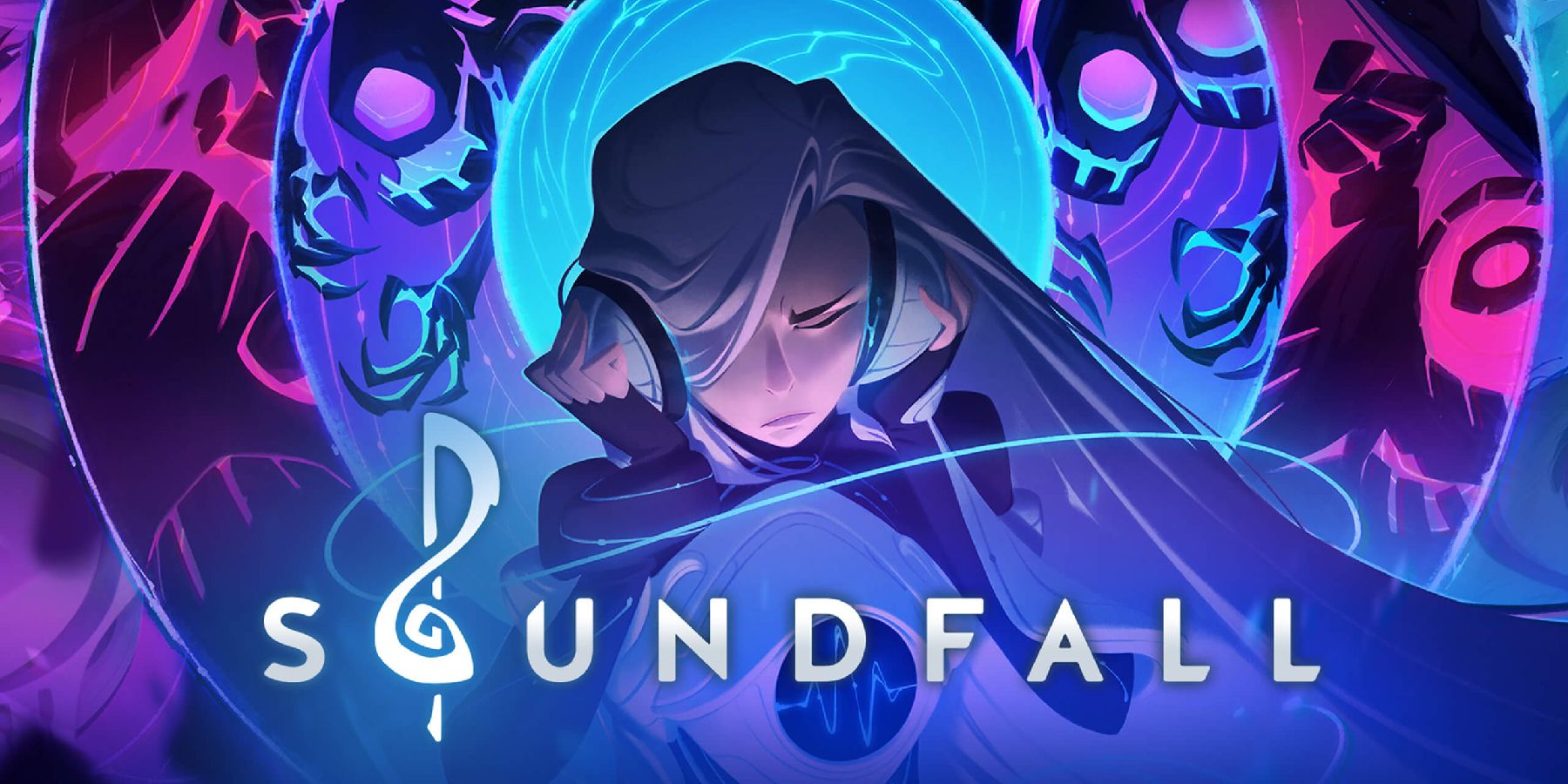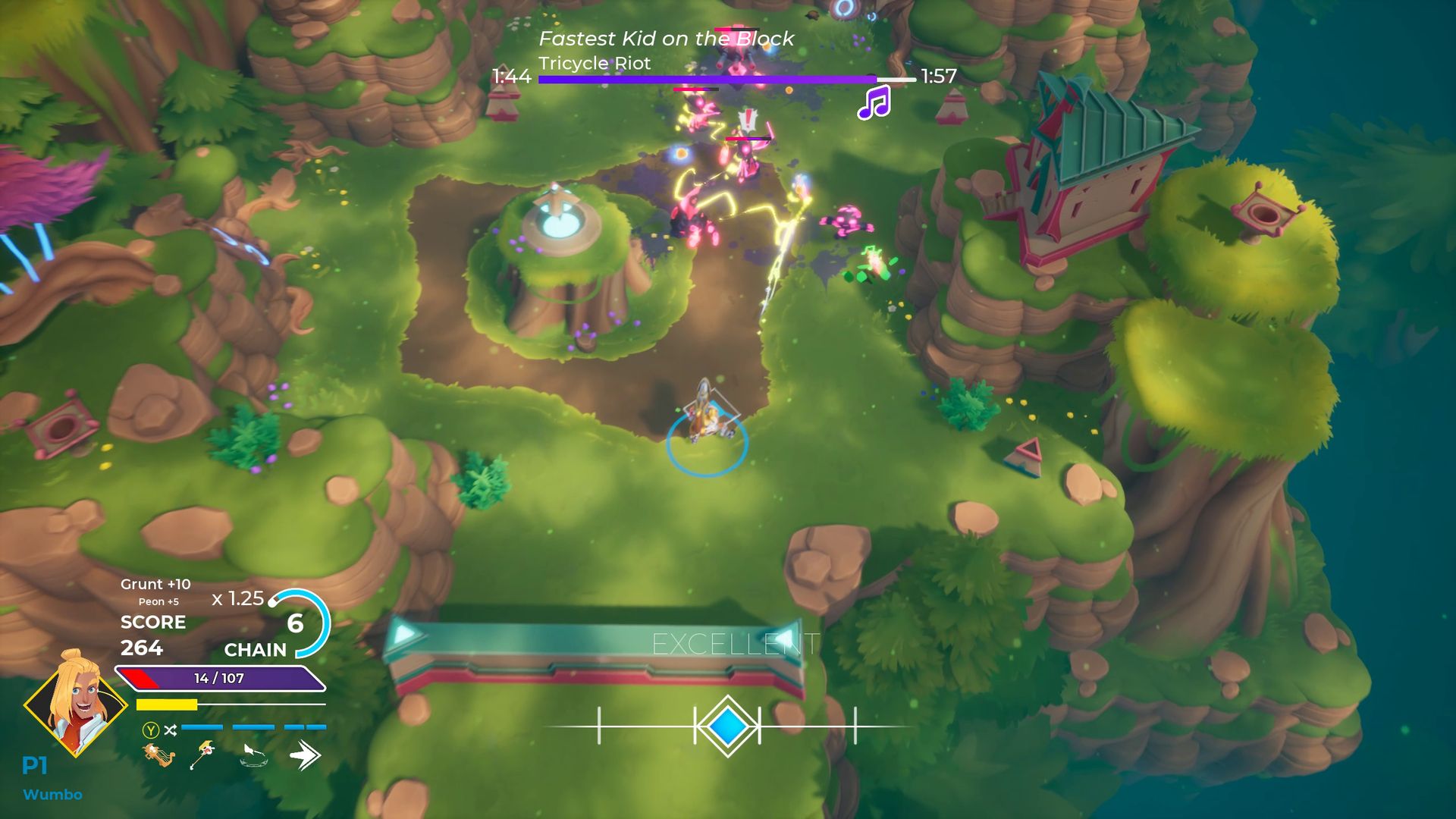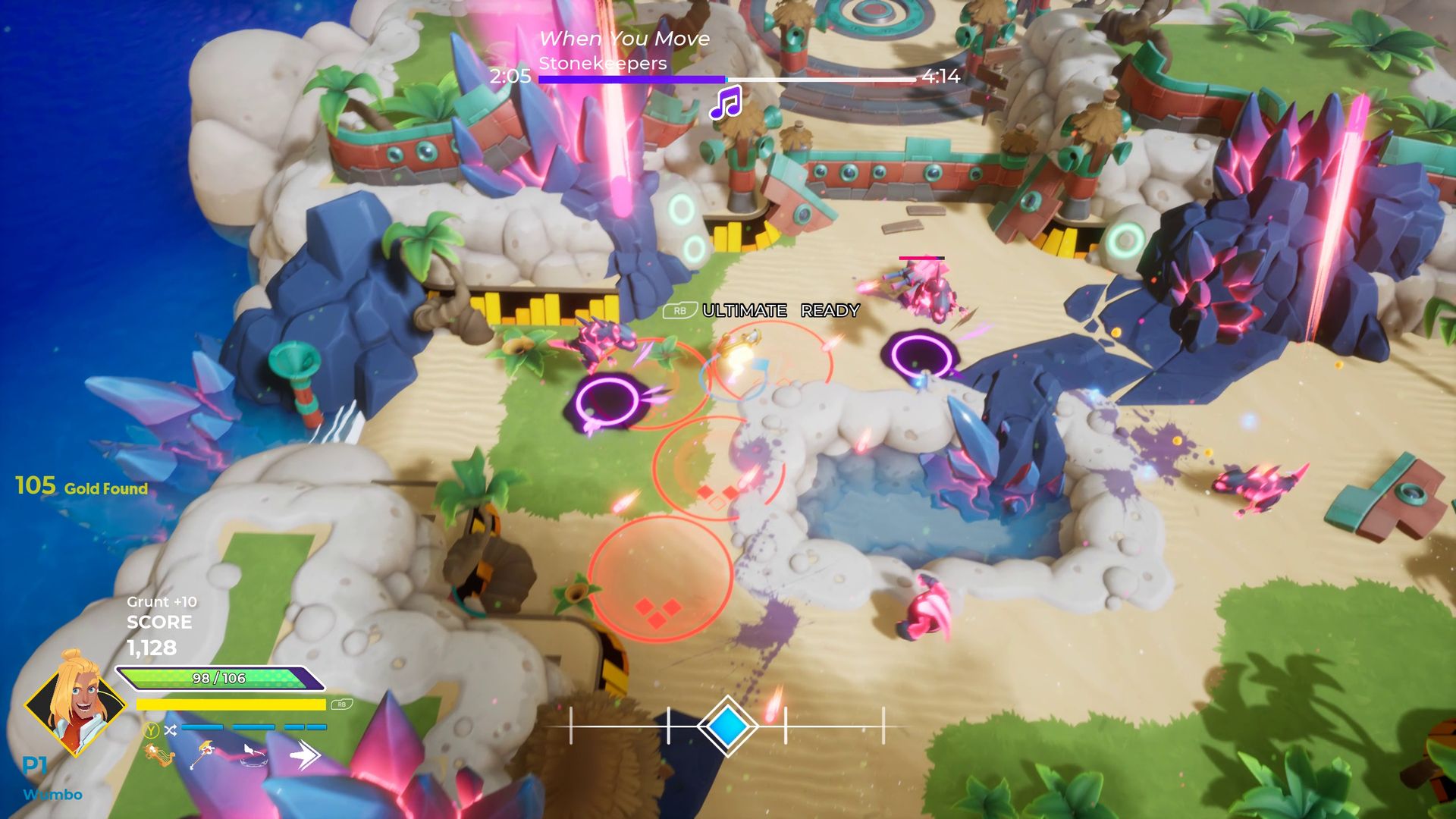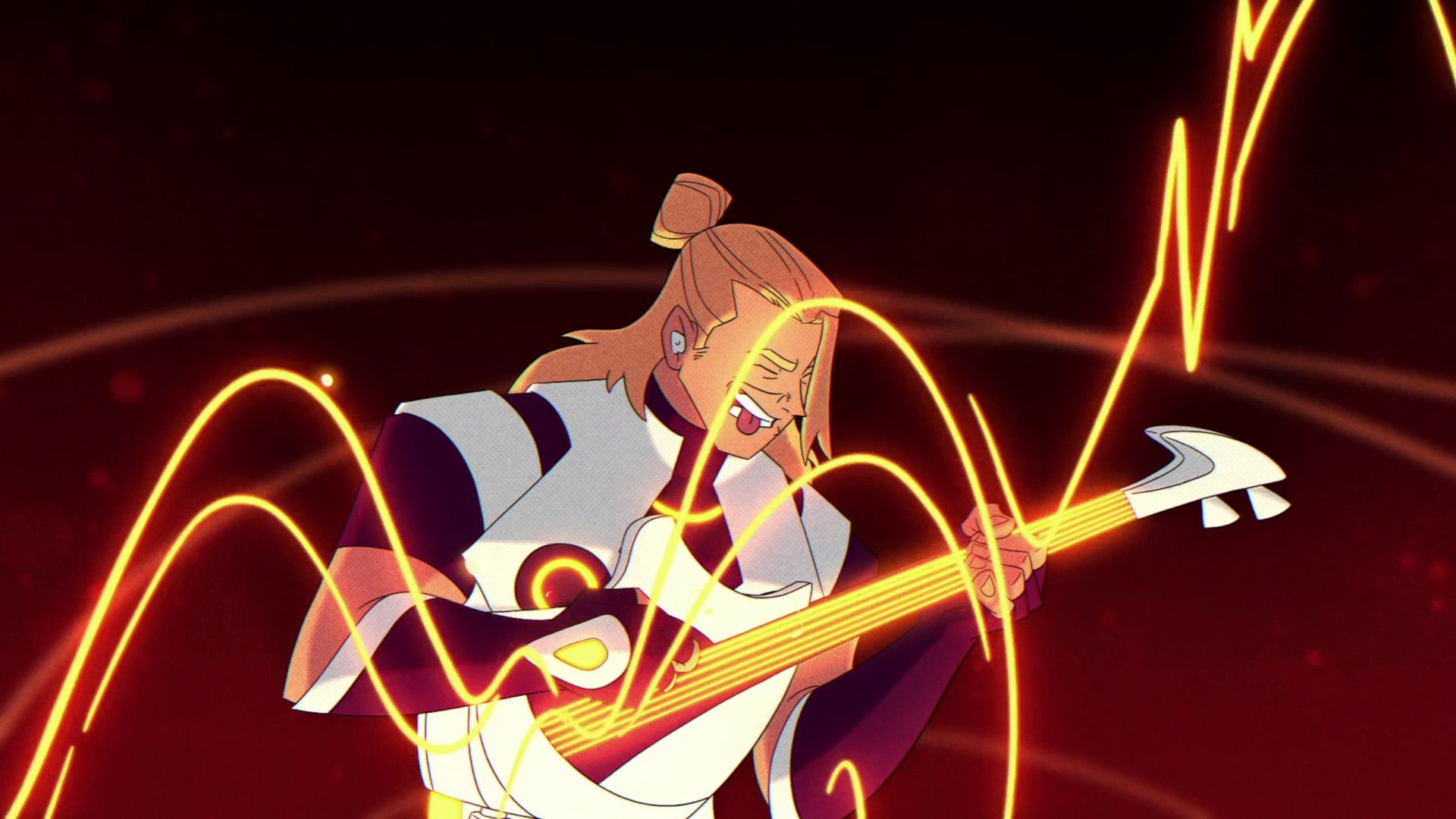At the intersection of music and gaming is a budding genre of rhythm-action games like Crypt of the NecroDancer or BPM: Bullets Per Minute, tying sound to player actions as a unique approach to game mechanics. Soundfall, developed by Drastic Games, is an ambitious twist on the rhythm game genre, featuring a looter-shooter premise akin to Diablo. While Soundfall nicely delivers on its promise of exciting, toe-tapping rhythm-action gameplay, it’s a mechanic that quickly becomes stagnant, and the game's looter-shooter mechanics struggle to pick up the pieces.
Soundfall opens with a largely forgettable storyline based around the main character, Melody, who finds herself whisked away from the real world and into the lands of Symphonia, the source of all music. A once struggling barista with unrealized musical talent, Melody now takes on the mantle of one of five Guardians of Harmony, each with a distinct musical aesthetic. Through the utilization of their musical skillsets, Melody and her friends must save Symphonia from the Discordians who threaten to destroy the world's music. Soundfall’s main questline will take players through a varied collection of biomes, all featuring a broad range of music genres that will satiate a wide audience of music listeners.
While cheery and upbeat, Soundfall’s story is a straightforward premise that is never particularly engaging. At each level’s conclusion, Soundfall splices in kitschy dialogue sequences that, while demonstrating the developer’s love for music thanks to various pop culture references, fail to invest players in the world of Symphonia and its characters. Players should not come to Soundfall for the story, as it does feel like an afterthought and can be bypassed entirely with the game’s Free Play mode. Where Soundfall truly sings is in its visual style and fun rhythm-based mechanics.
Artistically, Soundfall is quite a pretty game and a treat to watch in motion. While simplistic in its character models and enemy designs, what makes everything pop is its lively color palette and living world that bops to the beat of the soundtrack. Palm trees sway to Latin beats, and lava pools slam down to the heavy crash of metal symbols, bringing a visual harmony to an auditory feast. Through its use of diverse biomes ranging from cloudy Skylands filled with pop music to Cityscapes featuring thumping EDM beats, Drastic Games showcases its flexibility in audio scapes and art style throughout each biome’s ten levels.
In terms of its gameplay, Soundfall makes a great first impression with its intuitive introduction to its gameplay systems. As Melody adjusts to the world of Symphonia, players will also start to get a feel for the rhythm-based shooting and dodging mechanics as a metronome clicks away to the beat of the soundtrack. Compared to the more rigid grid-based mechanics of Crypto of the NecroDancer, Soundfall gives players far more freedom of movement due to its twin-stick shooter nature and fast-paced combat.
Gun blasts receive higher damage values by timing shots to the game’s metronome, while off-beat shots punish players with misfires and overheated guns. Dodging on beat also grants players a moment of invincibility, which becomes useful as the game gradually becomes a bullet-hell frenzy. Melody and her friends also have an arsenal of instrument-based weapons and special attacks, including an ultimate attack that players can charge by defeating Discordians.
Soundfall’s difficulty begins to scale upwards as players learn how to fall into the many grooves and riffs of the game’s soundtrack while also encountering better weapons and armor throughout each biome. Later levels become frantic as metal and punk soundtracks blast throughout each stage, offering more beats, opening the door to more actions, and spawning more enemies as a consequence. When Soundfall does begin to “click,” and players enter a flow-state as movement, combat, and rhythm become one, it is a delightful time that will make players nod their heads and wiggle their trigger fingers to the beat. However, Soundfall’s combat system eventually wears thin, as the game crescendos early on and repetition starts to set in.
Around the time players reach the third biome, they will have seen everything that Soundfall has to offer. By that point, players will have encountered all ten of the game’s enemy types, and the game’s loot drop system will begin to recycle weapons that once seemed new and unique. Unfortunately, Soundfall is a game that shows its hand too quickly and steadily becomes the same rhythm-action song and dance across its numerous repetitive levels.
While Soundfall’s biomes do vary in art style, the shooter's repetitive nature starts to set in when playing through each biome's level. Disappointingly, each stage progresses as a series of reused battle arenas that sprinkle environmental traps and rudimentary puzzles to reach the end. Fans making their way through each biome wouldn’t be remiss in feeling like some levels are almost exact replicas of previous ones. Aside from slight variations in object placement and detours for loot chests, Soundfall’s levels mostly pass by in a repetitive blur that makes up the contents of one biome. The only thing left to aid Soundfall is its loot game, which is unfortunately weak.
Unlike other games in the rhythm genre, Soundfall stands apart as a looter-shooter, offering better armor, more weapons, and enhanced weapon cores as the driving force in player progression. Still, these loot-based mechanics are underdeveloped and bring little value to the gameplay experience.
Aside from a few gameplay differences like weapons that feature chain lightning or armor that allows for an extra dodge or two, Soundfall’s weapons mostly play the same way, and armor sets frequently do little besides increase damage mitigation. As a looter-shooter, Soundfall struggles as there is no sense of uniqueness to loot, and players can easily walk past most optional chests and be just fine through most of the game. The drop rate for high-quality items is low, and loot chests presented to the player at the end of each stage will be enough to progress through the story at a quick pace.
As a rhythm game, Soundfall contains a straightforward premise. Internalize the beat, shoot on the beat, dodge on the beat, lather, rinse and repeat. There is a solid gameplay loop to build on top of here, but ultimately the game falls short in crafting a robust suite of mechanics to complement its rhythm-action base. Overall, Soundfall is a foundational title that needs to build upon its looter-shooter premise to create a much more engaging experience. Besides the PC version featuring an option to import local tracks and play levels à la carte, Soundfall makes a weak argument as to why players should stay hooked to its shoot-dodge-repeat mechanics in the long term.
However, it is worth noting that players with a Nintendo Switch or a Steam Deck may find Soundfall a compelling purchase, thanks to the pick-up and play nature of its three-minute-long levels and Free Play mode that takes players directly to the songs and levels they would like to play.
Soundfall’s critical mistake is that it lacks anything new and exciting past the game’s opening hours and too comfortably relies on rhythm mechanics that, while entertaining at first, grow stale in isolation. Drastic Games’ decision to give a Diablo-like spin to the rhythm game genre had potential, but its core loot-based elements are half-baked, and its level design is sorely lacking. While strong in its broad range of music and lovely art style, Soundfall is a game that needs more time to flesh out its gameplay systems before it's ready to hit the stage. Soundfall is a feast for the ears, a treat to the eyes, and an exercise in monotony.
Soundfall is available now for PC, PS4, PS5, Switch, Xbox One, and Xbox Series X|S. Game Rant was provided a PC code for this review.





